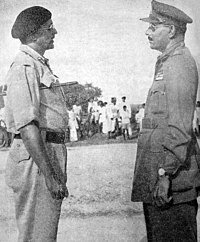|
Syed Ahmed El Edroos
Syed Ahmed El-Edroos (Arabic: سيد أحمد العيدروس, romanized: Saiyid Aḥmad al-‘aidarūs; 3 March 1899 – 20 July 1962) was the commander-in-chief of the Hyderabad State Forces at the time of the annexation of Hyderabad State by India in 1948. Life Syed Ahmed El-Edroos was of Arab Hadhrami descent.[citation needed] He was commissioned in 1919. El-Edroos participated in both World Wars, serving in the 1st Hyderabad Lancers. El-Edroos was a close confidante and trusted aide of the Nizam of Hyderabad.[citation needed] His brothers were also senior officers and distinguished members of the Nizam's army. He was ready for a war but was advised by the Nizam of Hyderabad, Mir Osman Ali Khan, not to fight and surrendered to the Indian Army forces outside of Hyderabad city so that there would be no bloodshed of innocent people.[1] In September 1948 El-Edroos held the rank of Major-General and Commander of the State Army of Hyderabad.[2] This numbered 6,000 men and consisted of three armoured regiments, a horse cavalry regiment, 11 infantry battalions and artillery. It was supported by 18,000 poorly armed and trained irregulars. In the course of Operation Polo, the Indian Army was able to scatter this mixed force in five days of fighting. General El-Edroos, who had advised the Nizam against opposing the entry of Indian forces, surrendered on 17 September. In 1950, General Edroos was arrested on the allegation of helping Mir Laiq Ali to escape to Pakistan. After two months he was released after an enquiry did not find any evidence against him. He left Hyderabad and settled in Bangalore. His children emigrated to Pakistan. [3] AutobiographyHis autobiography Hyderabad of the Seven Loaves was published in April 1994 and presented a historical account of the Asaf Jahi dynasty with an autobiographical sketch of the author, covering the events of Hyderabad's merger with the Indian Union. It narrates several anecdotes and facts about the city during the Nizami reign.[4] The book also contains some rare pictures of the royal and aristocratic events that took place at the time.[citation needed] References
External links
|
||||||||||||||||
